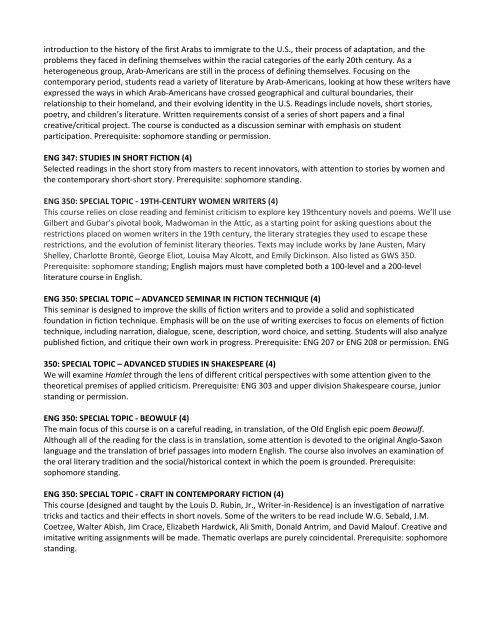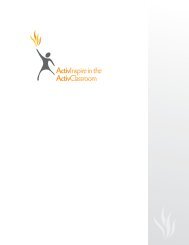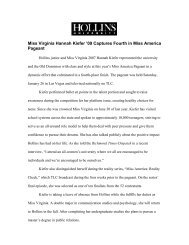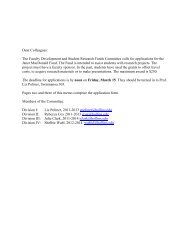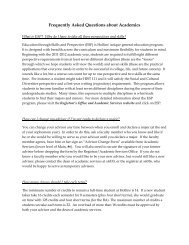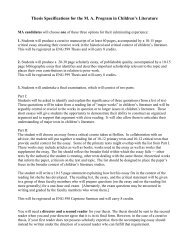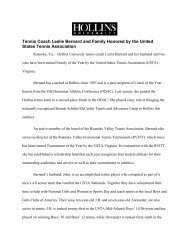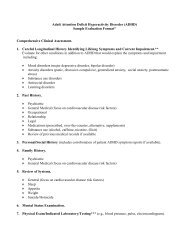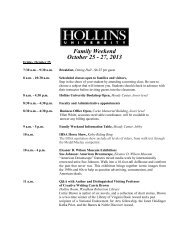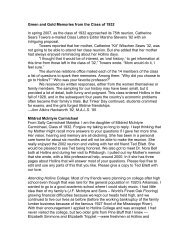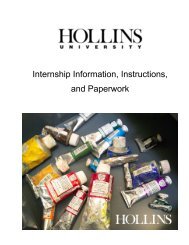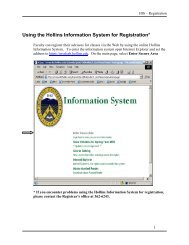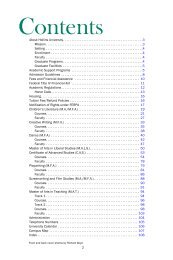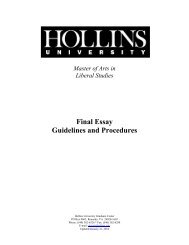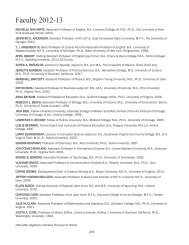ENGLISH & CREATIVE WRITING COURSE DESCRIPTIONS
ENGLISH & CREATIVE WRITING COURSE DESCRIPTIONS
ENGLISH & CREATIVE WRITING COURSE DESCRIPTIONS
Create successful ePaper yourself
Turn your PDF publications into a flip-book with our unique Google optimized e-Paper software.
introduction to the history of the first Arabs to immigrate to the U.S., their process of adaptation, and the<br />
problems they faced in defining themselves within the racial categories of the early 20th century. As a<br />
heterogeneous group, Arab‐Americans are still in the process of defining themselves. Focusing on the<br />
contemporary period, students read a variety of literature by Arab‐Americans, looking at how these writers have<br />
expressed the ways in which Arab‐Americans have crossed geographical and cultural boundaries, their<br />
relationship to their homeland, and their evolving identity in the U.S. Readings include novels, short stories,<br />
poetry, and children’s literature. Written requirements consist of a series of short papers and a final<br />
creative/critical project. The course is conducted as a discussion seminar with emphasis on student<br />
participation. Prerequisite: sophomore standing or permission.<br />
ENG 347: STUDIES IN SHORT FICTION (4)<br />
Selected readings in the short story from masters to recent innovators, with attention to stories by women and<br />
the contemporary short‐short story. Prerequisite: sophomore standing.<br />
ENG 350: SPECIAL TOPIC ‐ 19TH‐CENTURY WOMEN WRITERS (4)<br />
This course relies on close reading and feminist criticism to explore key 19thcentury novels and poems. We’ll use<br />
Gilbert and Gubar’s pivotal book, Madwoman in the Attic, as a starting point for asking questions about the<br />
restrictions placed on women writers in the 19th century, the literary strategies they used to escape these<br />
restrictions, and the evolution of feminist literary theories. Texts may include works by Jane Austen, Mary<br />
Shelley, Charlotte Brontë, George Eliot, Louisa May Alcott, and Emily Dickinson. Also listed as GWS 350.<br />
Prerequisite: sophomore standing; English majors must have completed both a 100‐level and a 200‐level<br />
literature course in English.<br />
ENG 350: SPECIAL TOPIC – ADVANCED SEMINAR IN FICTION TECHNIQUE (4)<br />
This seminar is designed to improve the skills of fiction writers and to provide a solid and sophisticated<br />
foundation in fiction technique. Emphasis will be on the use of writing exercises to focus on elements of fiction<br />
technique, including narration, dialogue, scene, description, word choice, and setting. Students will also analyze<br />
published fiction, and critique their own work in progress. Prerequisite: ENG 207 or ENG 208 or permission. ENG<br />
350: SPECIAL TOPIC – ADVANCED STUDIES IN SHAKESPEARE (4)<br />
We will examine Hamlet through the lens of different critical perspectives with some attention given to the<br />
theoretical premises of applied criticism. Prerequisite: ENG 303 and upper division Shakespeare course, junior<br />
standing or permission.<br />
ENG 350: SPECIAL TOPIC ‐ BEOWULF (4)<br />
The main focus of this course is on a careful reading, in translation, of the Old English epic poem Beowulf.<br />
Although all of the reading for the class is in translation, some attention is devoted to the original Anglo‐Saxon<br />
language and the translation of brief passages into modern English. The course also involves an examination of<br />
the oral literary tradition and the social/historical context in which the poem is grounded. Prerequisite:<br />
sophomore standing.<br />
ENG 350: SPECIAL TOPIC ‐ CRAFT IN CONTEMPORARY FICTION (4)<br />
This course (designed and taught by the Louis D. Rubin, Jr., Writer‐in‐Residence) is an investigation of narrative<br />
tricks and tactics and their effects in short novels. Some of the writers to be read include W.G. Sebald, J.M.<br />
Coetzee, Walter Abish, Jim Crace, Elizabeth Hardwick, Ali Smith, Donald Antrim, and David Malouf. Creative and<br />
imitative writing assignments will be made. Thematic overlaps are purely coincidental. Prerequisite: sophomore<br />
standing.


